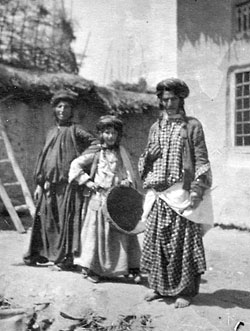Jews in Arab Countries During the Shoah

USC Shoah Foundation is partnering with the American Sephardi Federation and other organizations to undertake the Sephardi and Mizrahi Jewish Testimony Collection, a new initiative to document the Sephardi and Mizrahi experience during World War II and the Holocaust.
 Jews have lived in the Arab countries of North Africa and the Middle East—Algeria, Egypt, Iraq, Lebanon, Libya, Morocco, Syria, Tunisia, and Yemen—since biblical times. In 1939, more than 850,000 Jews lived in these countries; now there are just 26,000, as most Sephardi and Mizrahi Jews were forced to flee their native countries.
Jews have lived in the Arab countries of North Africa and the Middle East—Algeria, Egypt, Iraq, Lebanon, Libya, Morocco, Syria, Tunisia, and Yemen—since biblical times. In 1939, more than 850,000 Jews lived in these countries; now there are just 26,000, as most Sephardi and Mizrahi Jews were forced to flee their native countries.
“The experiences of the Sephardi and Mizrahi communities in North Africa and the Middle East that were impacted either directly or indirectly by Nazi ideology and its policies during World War II and the Holocaust are not well known,” says Jacqueline Semha Gmach, project director for the Sephardi and Mizrahi Jewish Testimony Collection.
Many informational sources exist concerning the events that led up to and resulted in the Holocaust, but they primarily deal with the experiences of the Jews of Europe. Documentation is sparse or not easily accessible on the plight of the Sephardi and Mizrahi Jews living in North Africa and the Middle East during the war. Each of these communities suffered persecution and hardships at the hands of the Nazi occupiers or governments that were Nazi sympathizers. Their lives were severely disrupted by the events of World War II and the Nazis’ desire to eradicate Jewish people. USC Shoah Foundation currently has collected some 1,000 testimonies from Sephardi Jews from countries outside of North Africa and Arab lands in its Visual History Archive.
“Despite these testimonies within the Visual History Archive,” says Stephen Smith, USC Shoah Foundation executive director, “there are still many untold stories of Jews who lived in North Africa and other Arab countries during World War II. The inclusion of their life histories in the Visual History Archive will help future generations understand the global impact and scale of Nazi ideology and its policies.”
The first two interviews for the Sephardi and Mizrahi Jewish Testimony Collection—Eva Boukris Weisel from Tunisia and Batia Cohen Goldman from Iraq—are in the process of recording in California in May 2013. USC Shoah Foundation is currently raising funds to record additional life stories with survivors from North Africa and other Arab countries. The goal is to chronicle their personal histories of life before, during, and after World War II.
USC Shoah Foundation will make the Sephardi and Mizrahi Jewish Testimony Collection available through its Visual History Archive to advance scholarship and research, to provide resources and online tools for educators, and to disseminate the testimonies for educational purposes.
Like this article? Get our e-newsletter.
Be the first to learn about new articles and personal stories like the one you've just read.